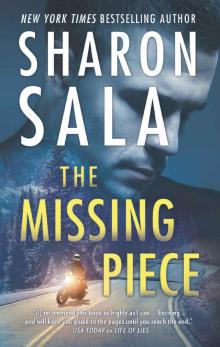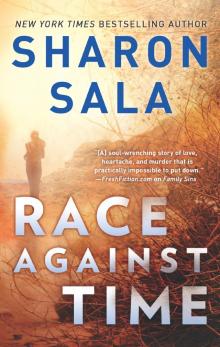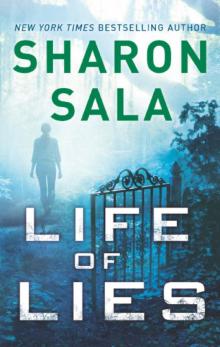- Home
- Sharon Sala
The Chosen
The Chosen Read online
Praise for New York Times bestselling author
SHARON SALA
“Well-developed secondary characters and a surprising ending spice up Sala’s latest romantic intrigue.”
—Publishers Weekly on Snowfall
“Wear a corset, because your sides will hurt from laughing! This is Sharon Sala at top form. You’re going to love this touching and memorable book.”
—New York Times bestselling author Debbie Macomber on Whippoorwill
“Ms. Sala draws you in from the very beginning. She delivers main characters who will touch your heart and quirky secondary characters who will intrigue you as you try to figure out whodunit.”
—Romantic Times on Butterfly
“Whippoorwill is a funny, heartwarming story, set in a raw, untamed land and rich with indelible characters that will stay with you long after the last page is turned. I didn’t want it to be over.”
—Deborah Smith, New York Times bestselling author of A Place to Call Home
“Once again, Sharon Sala does a first-rate job at blending richly developed characters and inspired plotting into an unforgettable read.”
—Romantic Times on Dark Water
Also by SHARON SALA
MISSING
WHIPPOORWILL
OUT OF THE DARK
DARK WATER
SNOWFALL
REMEMBER ME
REUNION
SWEET BABY
MIRA Books is also proud to publish
Sharon Sala under the pseudonym
DINAH MCCALL
Watch for Dinah McCall’s next novel
of romantic suspense
THE SURVIVORS
SHARON SALA
THE CHOSEN
During the writing of this book it seemed difficult for me to focus on fiction, even though the story was one I wanted to tell.
The reason for my distraction was that we were at war, and at the writing of this dedication are still at war, with no end in sight.
It seemed a bit shallow to be dwelling on my deadlines when there were families who had loved ones in the midst of fighting, and others who were having to bury fallen loved ones who’d died in the line of fire.
The dedications in my books have always meant a lot to me. I don’t just dash off a casual couple of thoughts and call it done.
And while this is such a small thing to do for our men and women in the military who are sacrificing so much, it is the only thing I can do for them, besides remembering them in my prayers.
So for every man and woman who wears a military uniform of the United States of America, and for every soldier who has perished in the line of fire, and for every family who’s sacrificed the ultimate, and for those who still fight, I honor you and pray for you, and I dedicate this book in your names.
Contents
Prologue
Chapter One
Chapter Two
Chapter Three
Chapter Four
Chapter Five
Chapter Six
Chapter Seven
Chapter Eight
Chapter Nine
Chapter Ten
Chapter Eleven
Chapter Twelve
Chapter Thirteen
Chapter Fourteen
Chapter Fifteen
Chapter Sixteen
Chapter Seventeen
Chapter Eighteen
Chapter Nineteen
Chapter Twenty
Chapter Twenty-One
Chapter Twenty-Two
Prologue
“I’m dying. They won’t say it, but I hear it in their voices. They look at my chart and then look away. Please, oh please, don’t let me die!”
Jay Carpenter’s panic was as silent as his voice. The last thing he remembered was slapping one of his girls for holding back money on him. He’d been running more than a dozen girls for over six years, and no matter how careful he was in picking them, there was always one who had to mess things up.
He remembered the impact of his palm against her face, and then he’d felt a sharp pain behind his right ear. After that, everything started spinning around him. He vaguely remembered the girls screaming and someone shouting, “Call 911!” And then everything had gone black.
All he knew now was that he was in a hospital, where he’d had surgery to remove a brain tumor, and that he had a fever that wouldn’t abate and an overwhelming sense of despair.
Alice Presley was in her eighteenth year of nursing, and during that time, thousands of patients had come under her care. She considered herself an old hand at the job and often claimed that she’d seen it all. But that was before the patient in bed 315B was admitted. She kept a wary eye on him as she bathed him, even though he was unconscious again. She’d looked at his chart often enough to know the history.
His name was Jay Carpenter—a fortysomething pimp who had passed out in his apartment and suffered a seizure.
He had been admitted with hallucinations.
The initial diagnosis of drug overdose had been dropped after the discovery of a tumor involving his pituitary gland and part of his brain.
Surgery had been performed, but unsuccessfully. Only part of the tumor had been removed.
He had a continuing fever, and kept lapsing in and out of a coma.
The only difference between this man and the countless others she’d ministered to was the fact that when he was conscious, he scared her.
His eyes were so dark they appeared to be black, and there was an odd smell about him that no amount of bathing seemed to change. It was a smell that she associated with the morgue, and if she didn’t know better, she would think he was already dead.
Just as the thought moved through her mind, he coded. Without a second of hesitation, she hit an alarm bell and then began performing CPR.
Nurses rushed in with a crash cart, followed by a pair of doctors who’d been on the floor making rounds. Each knew the other’s purpose and skillfully went through the motions of recovery, even though their initial efforts seemed futile.
“No, no, no! Not yet! Not like this!”
Jay Carpenter took his last breath at the same time that his soul left his body. It wasn’t anything like what he’d expected. There was no struggle to breathe, only a cessation of pain. For a brief moment, he was above his body and looking down, and then a force unlike anything he’d ever known began pulling at him—or whatever it was that he’d become. The gravity of his earthbound body was missing, and the only thing he could liken it to was the lack of control he’d once felt on the downhill slide of a giant roller coaster. Light surrounded him, bathing him in a warmth and love unlike anything he’d ever known. It was everything he’d ever wanted as a child and lacked as an adult—a love and acceptance he’d never believed existed. It was perfect, so perfect, but then something began to go wrong. The light that had warmed him began to retract. The implication didn’t sink in until the joy in his heart was replaced by an overwhelming sense of hopelessness.
The air began to vibrate with a multitude of voices wailing in chaotic abandon. The sound pierced his being, paining him in a way that stabbing knives would have pained his earthly flesh. What was left of that warmth and love had dissipated, replaced with every earthly fear he’d ever had—and in a quantity beyond imagination. Panic was followed by a horrifying realization.
This wasn’t heaven.
It was hell.
He began to scream, but the sound was lost in the wail of the countless souls already inhabiting the space. It was too late for regret. It was too late to ask God for forgiveness. It was too late—too horribly late—for everything.
Burning lakes of fire rose up before him. The stench of sulfur was without and within as evil surrounded him. Just at the point of complete absorptio
n, something happened. Only seconds from extinction, the same feeling of motion he’d had earlier was back, only this time he was being pulled up instead of down.
“Praise God!” he cried. “I’m going to heaven after all.”
Then a loud, hideous roar came at him from below, and although no words were ever spoken, still he heard the devil’s vow.
“You’ll never go to heaven. You’re already mine!”
“I’ve got a pulse!”
Jay thought he screamed, even as he was being sucked back into his body. He wanted to shout, to laugh and cry, to thank the doctors and nurses for bringing him back to life, but words were still beyond him.
It was days before he was cognizant enough to speak coherently. By that time, he had come to a definite sense of purpose and set his mind upon a twisted and daunting task. What he’d seen of hell had worked deep into his being. He knew it was inevitable that he would die again. It came to all men in good time, but to assure himself that his second journey would not be a repeat of the first, he had come up with what he considered a foolproof road to heaven.
After a disconcerting discussion with his surgeon, in which he’d learned they’d been unable to remove all of the tumor and he was living on borrowed time, his dedication to his plan became even firmer. He couldn’t bear to think about having to spend eternity away from that warm, comforting light of love. The more he thought about it, the more convinced he became that something drastic must be done. Within hours of being released from the hospital, he began his first step toward what he believed would be perfect redemption.
One
Nine months later
January DeLena was one of Washington, D.C.’s most well-known journalists. On 9-11, she’d been on-site and broadcasting only minutes after the plane had flown into the Pentagon. Then the world had watched as she’d abandoned her microphone and begun helping survivors who’d come running out of the building. By the time she’d remembered what she’d been sent there to do, she was covered in soot and blood, and had cursed and cried on air. Normally, that would have gotten her fired, but not that day. That day she’d only voiced what the nation had been feeling. By the end of the week, everyone knew the name of the pretty television journalist who’d called Osama Bin Laden a bad name.
Over time, it became apparent that January DeLena wasn’t just a pretty face. When it came to getting a story, she was tenacious, which was why on this night she was on the streets of the red-light district at one-thirty in the morning, mingling with the homeless, instead of sleeping in her own bed.
For months, she’d been hearing a rumor about a man who called himself the Sinner and who claimed to have had a near-death experience. Now she’d heard he was moving among the homeless and the lawless, preaching his own version of eternity. In most cases, this would have been just a story about another religious zealot. However, this story had a unique twist, and unique was the key to January’s success.
It had become fashionable to speak of near-death experiences. Many had written books on the subject, usually claiming that they hadn’t wanted to come back, and that they’d felt a great sense of peace in death. But this man had a different story to tell, and one that had tweaked her curiosity. According to the gossip on the street, this man had literally been to hell and back, and lived to tell the tale.
Now January huddled beneath the awning of a secondhand store as wind blew rain against the backs of her legs. She didn’t mind so much getting wet, but the stench emanating from the woman with her was overpowering, and getting wet only added to the odor. She turned her back to the wind and tried not to breathe too deeply as she spoke to the woman beside her.
“So, Marjorie, you say you’ve seen the Sinner yourself?”
Marjorie Culver’s fingers curled a little tighter around the push bar on her shopping cart. It had been a long time since anyone had taken notice of her, and the attention made her feel a little disoriented and vulnerable. Still, she felt no threat from this woman and finally nodded.
“Yep…I saw him two, maybe three days ago. He was beneath an overpass near the Potomac, passing out coupons for a free fish sandwich from Captain Hook’s. He had a whole basket of ’em. Someone said they were probably fakes, but I took one anyway, and they took it at the drive-through when I gave ’em my order.”
Then she laughed, as if struck by the humor of going through a drive-through on foot.
“Was he preaching?” January asked.
Marjorie shrugged. “I guess you could call it that.”
“What do you mean?” January pressed.
“Well, he was holding a Bible and all, but what he was saying sounded pretty radical. I don’t think he was quoting any scriptures.” She shrugged again. “It didn’t really matter, though. No one was paying him any mind. They just wanted the coupon for the free sandwich.”
January nodded. She certainly understood. There had been days in her youth when she might have done just about anything for something to eat. Thank God those times were far behind her.
“Do you know where he lives?” January asked.
Marjorie frowned. “Nowhere and everywhere, I guess. I wasn’t sure, but I got the impression that he was one of us.”
“You mean homeless?”
Marjorie glared. “For some, it’s a choice, you know.”
January backed off on her intensity. “I’m not demeaning your existence, Marjorie. I was only asking as a means of locating him so I can talk to him myself.”
Marjorie frowned and shoved her cart a little closer to the door she was leaning against. The stuff in her cart was all she owned, although she’d long since forgotten what all was in there.
“Yeah, well…I can’t help you any on that. I’m not into addresses myself.”
January sighed. She hadn’t meant to, but she’d obviously insulted the woman. “All right then,” she said, and gave Marjorie’s arm a quick squeeze. “Thank you so much for talking to me, Marjorie.” Then she slipped a hundred dollars worth of twenties into Marjorie’s hand. “Get yourself a room tonight and treat yourself to something good to eat.”
Marjorie was taken aback by the money and for a moment thought about being insulted all over again, but then a quick gust of wind blew rain down her neck. She took the bills and stuffed them into one of her countless pockets.
“Yeah…I’ll do that,” she said, then added, “See you on the TV.”
“Absolutely,” January said, wondering when Marjorie ever got to watch TV, and made a dash toward her car, which was parked less than half a block away.
Once inside, she locked the doors and breathed a quick sigh of relief that she had a home to go to and a car to get her there. When she turned the key, the sound of the engine starting echoed the jump of her heartbeat. As she turned on the windshield wipers, a tall thin man wearing dirty white pants and a shirt that hung loose to his knees stepped out of the alley in front of her. His clothes were sopping wet. His long hair was equally soaked, and plastered to his face and neck, as was the beard hiding most of his face. There was a brief moment of connection as their gazes met. When he began to smile, she hit the headlights, flipping them on bright. It was his signal to move, which he did, but without shifting his gaze.
The expression in the man’s eyes made January shudder. The degradation of the place and its people hit her like a slap in the face, and for the first time in her life made her doubt the wisdom of following this story.
Then she gathered her wits and reminded herself of how far she’d come from the poor little Latino girl from Juarez, Mexico, to the woman she was today. She’d worked long and hard to gain credibility, and apologized for nothing. With renewed vigor, she slammed the car into gear and stomped on the accelerator. Tires squealed as rubber burned. All she needed was a hot bath and a good night’s sleep, and she would be fine.
Less than a mile from her apartment, a police cruiser came racing past her, running with lights and siren. Up ahead, she could see what appeared to be at least a half-do
zen more police cars and almost as many emergency vehicles.
Immediately, her heartbeat accelerated as her instinct for the story rose. But she reminded herself she was not on duty, and as she drove past, saw the news crew from her station.
Kevin Wojak was standing near an ambulance with a mike in his hand, speaking directly into a camera as rain peppered his face. She smirked. All he had to do was take a few steps to the left and he would have been standing under a canopy, but that would have diluted the dramatic effect he was obviously going for.
Wojak considered January competition.
January considered Wojak a pain in the ass.
Despite her reluctance to watch Wojak working the camera, she was forced to stop as an ambulance pulled away from the scene. When it raced past her, she said a quick prayer for the occupants, then waited for traffic to clear.
As she waited, a tall, dark-haired man suddenly stepped out from between two parked police cars and walked in front of her vehicle, momentarily spotlighting himself in her headlights, much as the bearded man on skid row had done earlier. But her reaction to this man was far different. She knew him intimately, had made love to him in her bed, on the living room floor, in her shower, and once in her walk-in closet—but only in her dreams. Benjamin North, one of D.C.’s finest homicide detectives, didn’t know it, but he haunted her sleep, taunting her with his heavy-lidded stare and slow, sexy smile.
In reality, they’d done little more than trade jibes at various crime scenes—his springing from disgust at the arrival of the media and hers from what she considered unfair disrespect. Except for one night over a year ago.

 Blind Faith
Blind Faith Second Sight
Second Sight Count Your Blessings
Count Your Blessings The Missing Piece (The Jigsaw Files)
The Missing Piece (The Jigsaw Files) Bloodlines
Bloodlines Sudden Danger
Sudden Danger King's Ransom
King's Ransom Once in a Blue Moon
Once in a Blue Moon A Rainbow Above Us
A Rainbow Above Us Always a Lady
Always a Lady Touchstone
Touchstone The Whippoorwill Trilogy
The Whippoorwill Trilogy I, Gracie
I, Gracie Honor's Promise
Honor's Promise Rider on Fire
Rider on Fire The Gathering
The Gathering Don't Cry for Me
Don't Cry for Me The Way Back to You
The Way Back to You Swept Aside
Swept Aside Blood Stains
Blood Stains Chance McCall
Chance McCall Out of the Dark
Out of the Dark For Her Eyes Only
For Her Eyes Only 'Til Death (A Rebel Ridge Novel)
'Til Death (A Rebel Ridge Novel) Roman's Heart
Roman's Heart Snowfall
Snowfall Dark Hearts
Dark Hearts Mission: Irresistible
Mission: Irresistible A Place to Call Home
A Place to Call Home Betrayed
Betrayed The Lunatic Detective
The Lunatic Detective The Dove
The Dove Windwalker
Windwalker The Miracle Man
The Miracle Man The Curl Up and Dye
The Curl Up and Dye Familiar Stranger
Familiar Stranger Sweet Baby
Sweet Baby The Boarding House
The Boarding House Bad Penny
Bad Penny Remember Me
Remember Me Race Against Time
Race Against Time The Dove (Prophecy Series)
The Dove (Prophecy Series) The Way to Yesterday
The Way to Yesterday The Healer
The Healer The Color of Love
The Color of Love Missing
Missing Next of Kin
Next of Kin A Field of Poppies
A Field of Poppies Cold Hearts
Cold Hearts Deadlier than the Male
Deadlier than the Male Color Me Bad: A Novella
Color Me Bad: A Novella Lunatic Times Two: 4 (The Lunatic Life Series)
Lunatic Times Two: 4 (The Lunatic Life Series) Capsized
Capsized Sympathy Pains
Sympathy Pains ROYAL'S CHILD
ROYAL'S CHILD In Shadows
In Shadows 3, 2, 1...Married!
3, 2, 1...Married! Family Sins
Family Sins The Chosen
The Chosen Life of Lies
Life of Lies Lunatic Revenge
Lunatic Revenge When You Call My Name
When You Call My Name I'll Stand By You
I'll Stand By You Saving Jake
Saving Jake Going Gone
Going Gone ANNIE AND THE OUTLAW
ANNIE AND THE OUTLAW Butterfly
Butterfly Cut Throat
Cut Throat Ryder's Wife
Ryder's Wife The Hen House
The Hen House Amber by Night
Amber by Night The Amen Trail
The Amen Trail Mimosa Grove
Mimosa Grove Dark Water
Dark Water Wild Hearts
Wild Hearts Blood Trails
Blood Trails The Warrior
The Warrior Shades of a Desperado
Shades of a Desperado Going Twice
Going Twice A Piece of My Heart
A Piece of My Heart You and Only You
You and Only You Nine Lives
Nine Lives Whippoorwill
Whippoorwill